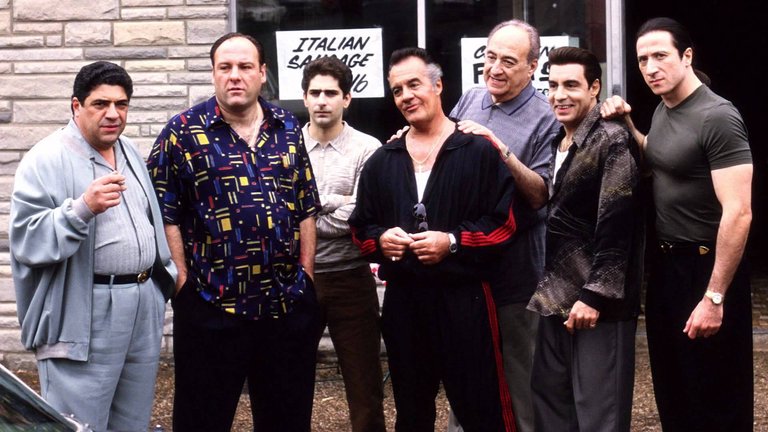Television Review: House Arrest (The Sopranos, S2X11, 2000)

House Arrest (S02E11)
Airdate: March 26th 2000
Written by: Terence Winter
Directed by: Tim Van Patten
Running Time: 57 minutes
The eleventh episode of Season 2, titled House Arrest, poignantly illustrates the challenges of achieving or even maintaining a semblance of normalcy for individuals entrenched in the world of organised crime. The plot intricately weaves the lives of its characters, primarily focusing on Tony Soprano and his Uncle Junior, both of whom grapple with the implications of their criminal lifestyles amidst personal turmoil.
Tony Soprano's initial euphoria following his successful evasion of murder charges in the previous episode is short-lived. His lawyer, Neil Mink, delivers a sobering reality check, cautioning Tony that the FBI will relentlessly pursue any potential criminal charges against him. Mink's advice underscores a pivotal turning point for Tony: to avoid further trouble, he must genuinely invest in his legitimate waste management business—a venture he has previously regarded merely as a façade for his illicit activities. In an attempt to embrace this new direction, Tony makes a concerted effort to distance himself from his criminal associates at the Bada Bing and immerses himself in the operations of his waste management company. He engages with trade publications and seeks guidance from his trusted partner, Dick Barone, played by Joe Lisi. However, this pursuit of legitimacy soon leads to ennui; even the sexual liaison with Dick's attractive assistant, Connie DeSapio (portrayed by Jennifer Albano), fails to alleviate his growing discontent. As boredom transforms into anxiety, Tony experiences another panic attack during a therapy session with Dr. Melfi. Her insights suggest that the absence of criminal activity may be exacerbating Tony's anxiety, prompting him to reconnect with his criminal associates in search of solace.
Simultaneously, Uncle Junior faces his own struggles under house arrest, which he finds intolerable despite the loyal companionship of Bobby Baccalieri and fleeting interactions with attractive nurses. A chance encounter with Catherine Ramano (played by Mary Louise Wilson), a childhood friend and widow of a police detective, momentarily uplifts Junior's spirits. However, his attempts to rekindle their friendship are thwarted by his confinement and reluctance to disclose his situation. When he eventually confesses to Catherine about his house arrest, her understanding nature—given her late husband's ties to the mob—allows them to bond over shared experiences as they spend an evening watching television together.
Dr. Melfi’s quest for normalcy proves equally elusive as she increasingly resorts to alcohol to cope with the stresses stemming from her sessions with Tony. Her drinking begins to affect her professional demeanour, culminating in an embarrassing confrontation with a restaurant patron while dining with her son, Jason La Pena. Concerned about her well-being, her therapist Dr. Kupferberg suggests more drastic measures to address her deteriorating condition.
In the backdrop of these personal struggles, Tony's authority is continually undermined by both Uncle Junior and Richie Aprile. Together, they exploit Bobby Zanone's garbage collection business as a cover for a small-scale cocaine operation. When Tony discovers this illicit venture, he expresses discontent due to the potential attention it could draw from law enforcement. Junior defends their actions as necessary for covering legal and medical expenses but ultimately agrees to cease operations. However, Tony later learns that Richie has persisted with the drug dealing after one of their dealers is arrested.
House Arrest stands out as a well-crafted episode despite its seemingly mundane plot progression; it is rich in character development and thematic depth. The dialogue is sharp and infused with humour that lightens an otherwise heavy narrative arc. The scriptwriters cleverly integrate numerous pop culture references from the 1990s throughout the episode, enhancing its relatability while providing commentary on contemporary society. Among these references is an esoteric nod to Marshall McLuhan, a Canadian philosopher renowned for his work on media theory—a detail likely lost on many viewers but emblematic of the show's intellectual undercurrents.
While House Arrest may not be particularly remarkable within the broader context of The Sopranos, it maintains the series' high standards and lays important groundwork for future developments in Tony Soprano's saga.
RATING: 6/10 (++)
Blog in Croatian https://draxblog.com
Blog in English https://draxreview.wordpress.com/
InLeo blog https://inleo.io/@drax.leo
InLeo: https://inleo.io/signup?referral=drax.leo
Hiveonboard: https://hiveonboard.com?ref=drax
Rising Star game: https://www.risingstargame.com?referrer=drax
1Inch: https://1inch.exchange/#/r/0x83823d8CCB74F828148258BB4457642124b1328e
BTC donations: 1EWxiMiP6iiG9rger3NuUSd6HByaxQWafG
ETH donations: 0xB305F144323b99e6f8b1d66f5D7DE78B498C32A7
BCH donations: qpvxw0jax79lhmvlgcldkzpqanf03r9cjv8y6gtmk9
Posted Using INLEO